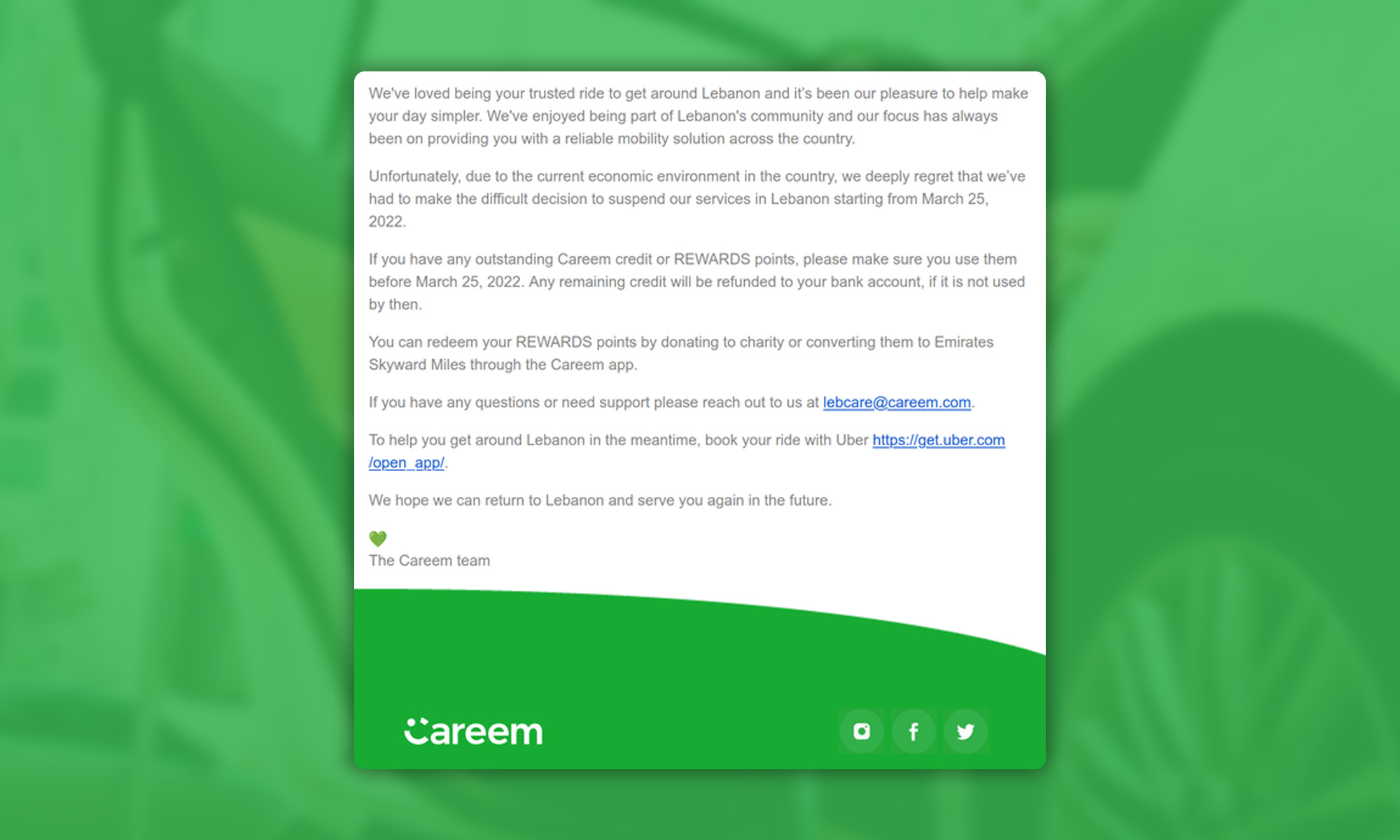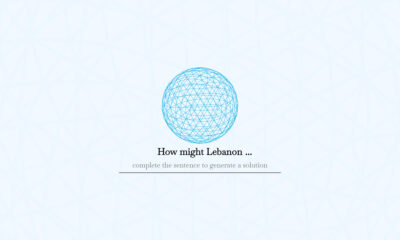News
Careem Is Officially Suspending Its Services In Lebanon
Careem customers who have outstanding Careem credit or REWARDS points are encouraged to use them before March 25, 2022.

Recently, vehicle for hire company Careem has announced its decision to leave Lebanon due to the unfavorable economic situation in the country.
“Unfortunately, due to the current economic environment in the country, we deeply regret that we’ve had to make the difficult decision to suspend our services in Lebanon starting from March 25, 2022” said the Careem team in the official statement.

Careem customers who have outstanding Careem credit or REWARDS points are encouraged to use them before March 25, 2022. If they don’t make the deadline, their remaining credit will be automatically refunded.
REWARDS points can be redeemed through the Careem app, by converting them to Emirates Skyward Miles or donating them to charity.
Careem was founded in 2012 as a service for corporate car bookings. The service gradually expanded to include personal ride-hailing and food delivery. In 2019, Careem was acquired by Uber for $3.1 billion, which made it the first unicorn startup company in the Middle East (not including Israeli unicorn startups).
Also Read: PayPal In Lebanon: Everything You Need To Know
During the first 10 months of 2021, Careem recorded 4.3 million rides, with 52 percent of its customers using the service to commute to work, and 46 percent using it for leisure trips.
It’s now clear that Careem’s success hasn’t been enough to offset the worsening economic situation in Lebanon. Since the start of the economic crisis, the Lebanese pound has lost more than 90 percent of its value, following a 58.1 percent contraction of Lebanon’s GDP between 2019 and 2021.
What’s more, the company has faced stiff competition from Bolt, which currently charges approximately the same as regular taxi drivers do for shorter trips. It’s tough to see yet another business leave Lebanon, but during times like this, there’s only one thing to say – yalla, bye!
News
Mamo Completes $3.4M Funding Round To Enhance Fintech Services
The startup will use the influx of cash to expand into Saudi Arabia and across the wider GCC while improving its product offering.

UAE-based fintech Mamo has announced the completion of a $3.4 million funding round that will help the startup extend its market presence and improve its product offering. Investors included 4DX Ventures, the Dubai Future District Fund and Cyfr Capital.
Mamo’s platform offers “payment collection, corporate cards and expense management” to help small and medium-sized businesses consolidate and streamline their operations. With the latest influx of capital, Mamo will further develop its comprehensive suite of services and begin testing its product lines in Saudi Arabia, further extending its footprint across the GCC.
Imad Gharazeddine, co-founder and CEO of Mamo, stated: “We’ve been in the market for a while now and are incredibly proud of what our team has achieved. The holistic and expansive nature of our product offering has helped us continue to grow sustainably. This additional funding will allow us to reach our medium-term goals even faster. The support from new and existing investors is a testament to our strong expertise and the ability to deliver on our customer promise”.
Daniel Marlo, General Partner of lead investor 4DX Ventures, added: “We have immense trust in Imad’s vision, leadership and Mamo’s innovative approach to provide a user-friendly and comprehensive financial solution for SMEs that makes financial management more accessible and efficient. We are proud to partner with them and support their mission”.
Also Read: A Guide To Digital Payment Methods In The Middle East
Amer Fatayer, Managing Director of Dubai Future District Fund’s investment team, also commented: “Mamo’s localized product lines serve as an infrastructure for SME payments and spend management in UAE, a segment that is underserved by the country’s current banking infrastructure. The team has taken a product-first approach to consolidating SMEs’ financial journeys and building a fintech solution deeply embedded in a business’s core operations”.
To date, Mamo has raised around $13 million in investment funding and now boasts a team of 30 people. The company’s intuitive financial services platform has allowed over 1,000 businesses to consolidate their financial operations and significantly reduce payment fees.
-

 News4 weeks ago
News4 weeks agoAmazon Prime Day 2024: Get Ready For 6 Days Of Amazing Deals
-

 News4 weeks ago
News4 weeks agoSamsung Unpacked 2024: What To Expect From The July 10 Event
-

 News4 weeks ago
News4 weeks agoCoursera Report Shows Surge In UAE Interest In AI Upskilling
-

 News4 weeks ago
News4 weeks agoMeet Dubai’s Groundbreaking Smart Robot Delivery Assistant
















